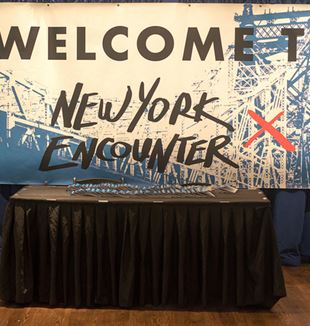
Friday at the New York Encounter: An Unmistakable Urge
A documentary on the APAC prisons in Brazil, a letter to Ivy League professors, a panel on "the kindness of science," and a performance of the work of jazz legend John Coltrane. Read the recap of Friday at the New York Encounter.In Brazil, there is a prison that has no guards. Actually, there are a hundred such prisons in the country, with more being opened both there and around the world every year. Painted over the door is a sign that reads “the man enters; the crime is left outside.” “One of the things that shocked me,” says a man named Bruno, “was being asked to take care of the main entrance. I sat down and thought ‘these people are crazy. How can they give the key to a convict with a 17-year prison sentence? But at the same time, I thought ‘they trust me, and I don’t want to lose that trust.’’” Bruno is one of the recuperandos - those in recovery - interviewed in the documentary film Unguarded, which focuses on the Association for Protection and Assistance to Convicts (APAC) prisons. The film has not yet been completed, but a ten-minute trailer for it was shown during the opening event at the 2019 New York Encounter. The various interviews in the trailer depict something that seems impossible: the miracle that people can change. “When the recuperando builds or paints,” explains Denio Marx Menezes in Unguarded, “he realizes there is something good inside him. The hands that did evil now do good.” For this reason, work is an integral part of the APAC program. Brazil is the third most incarcerated nation in the world. The trailer began with clips from the state prison system - images of assault, of inhumane prison conditions, of prison riots. “How could I believe in love,” wonders Bruno in the film, “when my fellow inmates slept in the bathroom? How could I believe in recovery, when the guards pepper-sprayed us?” While 70 percent of those who leave the state prisons wind up in prison again later, for APAC that number is in the teens. “My motivation,” Simonetta d’Italia-Weiner, who is directing the film, said in an interview, “was my friendship with people who have been in prison” and have recovered. “I wanted to talk about redemption being possible.” APAC, she said, focuses on “the reeducation of the recuperandos to their humanity,” to their innate desire for good, which crime cannot obliterate. Being treated as humans, and not criminals, given meaningful work, and being reintroduced to society over time, this desire becomes a reality.
The trailer for Unguarded was shown as part of the opening event of the Encounter, entitled “A Blossom in the Desert.” It was followed by a video message from Fr. Ibrahim Alsabagh, pastor of Latin Rite Catholics in Aleppo, Syria, who have been caught in the middle of the Syrian civil war over the last seven years. Among the stories that he retold was one of a parishioner named Roula, who teaches catechesis to the children. Although French herself, she lives in Aleppo with her Syrian husband and their daughter. Multiple times during the war, her home has been destroyed. She, her husband, and her daughter have all narrowly avoided death. But the members of the church came together to rebuild their home. “The Church cannot take away the cross,” said Fr. Ibrahim, “but it can make it lighter.” In the midst of so much bitterness, insecurity and fear, Roula understood she was called to stay in Aleppo. She started the catechesis for children, which grew to the point that now nine hundred attend. “By opening herself to the needs of others,” concluded Fr. Ibrahim, “she has discovered the many gifts of her life.” 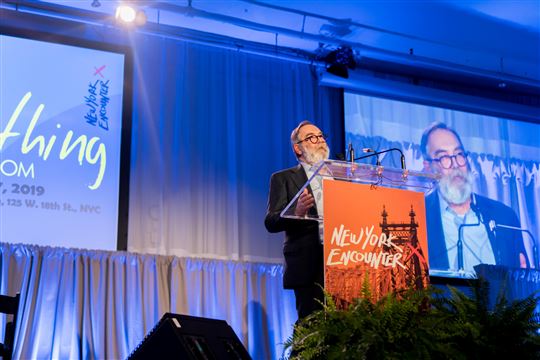
The program continued with a stirring cello performance by Marcel Krasner, and was concluded by Miriam Huettner, an alumnus of Harvard. In response to an open letter from Ivy League professors entitled “Think for yourself,” Huettner and some of her colleagues began a dialogue about groupthink and conformism. In the letter, they professors had encouraged students to take the risk of asking real questions, even when this would result in conflict. Reading the letter, Huettner said, “caused us to recognize that this challenge of overcoming the tyranny of public opinion exists first and foremost within us… We often think it would be better to stay quiet and to keep our questions and thoughts to ourselves, so as not to risk losing the respect of friends.” Eventually, they reached out to the authors of the letter, and continued the dialogue with them. “It is exceedingly rare,” one of the professors told her, “that I have the chance to talk so openly about such fundamental and important questions. It is also genuinely encouraging to see that there are students out there who are so engaged by such questions that they will travel to speak with professors about them. You all made quite an impression on me.”
While apparently distinct from one another, the different moments from “A Blossom in the Desert” each demonstrated a small new bud of life in a place where none could be expected: in the face of a world that has decided forgiveness is impossible, changed people at the APAC prisons; responding to the desperation and meaninglessness of civil war, people who continue not only to survive but to care for one another; in universities plagued with ideological lockstep, professors and students who desire true dialogue. 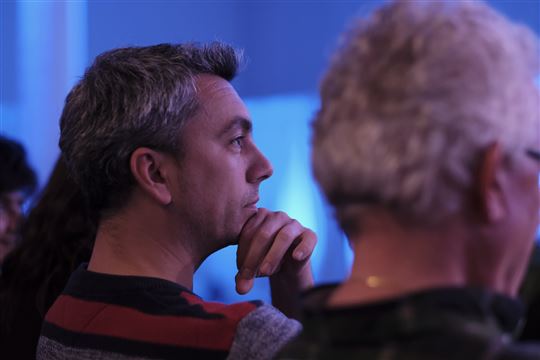
As Miriam Huettner noted in her remarks, it is often necessary to be provoked by someone in order to reawaken these desires. This was evident during the presentation of the exhibit “The Kindness of Science,” which tells the stories of three medical doctors who changed their field through their love for their patients and their craft. In the lives of each of the doctors, the curators of the exhibit identified four key themes: the encounters that shaped them, their understanding of science as service, their passion for all of life, and their ability to sacrifice in the face of suffering. Each of the presenters described how, through their work on the exhibit, they were reawakened themselves. The presentation began with Dr. Giancarlo Rastelli, an Italian cardiac surgeon. “He is the primary example of a Christian doctor,” said Gerardo Russo, who recently graduated in medicine from the University of Bologna. “I was inspired by his kindness and his love for his young patients, a love that prompted him to give himself totally until the end of his life. After learning about him, I started to face my studies with a different attitude.” Rastelli developed the Rastelli Classification System, which has to do with the atrioventricular canal, and is still in use today. Even after being diagnosed with Hodgkin's lymphoma, Rastelli continued to treat patients.
Erika Pace presented Dr. Cicely Saunders. Born in England in 1918, Saunders developed palliative care, and founded St. Christopher hospice, which Pace visited in her work on the exhibit. “The staff and patients look happy when you visit,” Pace explained. “This is what I felt. You truly can breath joy everywhere in that building.” Saunders’ work focused on those whom society would rather not see: the very sick, the elderly, those close to death. Like the people working in the APAC prisons in Brazil, she recognized the inherent value of those she served, and devoted her life to them. Through preparing the exhibit, Pace met many people, including Saunders’ brother, who were deeply impacted by her work. And she found herself impacted as well in her work with cancer patients.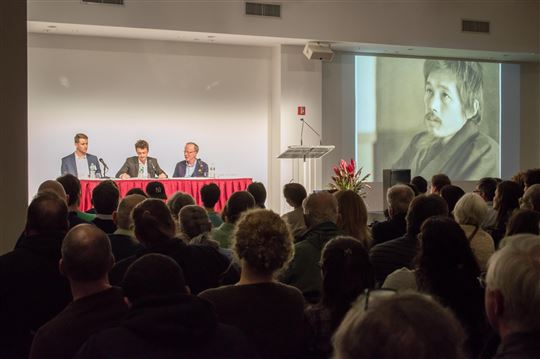
Jeremy Lickteig and Pietro Mariani, two students from Benedictine College, presented Dr. Takashi Nagai, a Japanese radiologist who survived the atomic bombing of Nagasaki. After the bombing, in which he lost his home and his wife and was himself seriously wounded, Nagai devoted himself to the treatment of the survivors. “I was amazed by how he responded to the people in his life,” remarked Mariani. “Human suffering didn’t scare him. He didn’t shut himself out, but was open to understanding a greater meaning within it.” Like Fr. Ibarhim in Syria, Dr. Nagai sought meaning in the aftermath of disaster.
The evening ended with a performance of works by jazz legend John Coltrane entitled “A Love Supreme.” Pieces of music were paired with quotes from Coltrane about his work and the journey of his life. Andrea Domenici played the piano, with well-known jazz drummer Billy Drummond, saxophonist Sam Dillon, and bassist Fabrizio Sciacca. The title of the event came from an album by Coltrane. “This whole album,” Domenici, whose own jazz record will be released later this month, told me in an interview, “is a big prayer.” As was evident in the quotes selected, Coltrane was consciously on a search. “To be a musician is really something. It goes very, very deep. My music is the spiritual expression of what I am - my faith, my knowledge, my being... When you begin to see the possibilities of music, you desire to do something really good for people, to help humanity free itself from its hang-ups.” 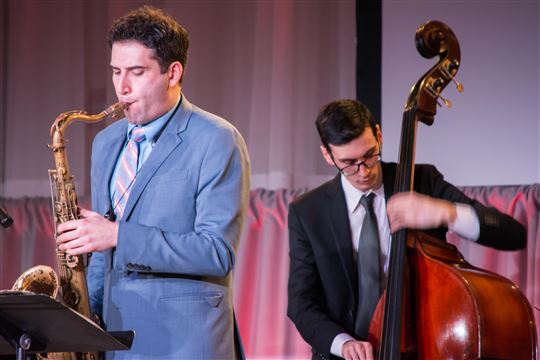
While the band was playing music by Coltrane, jazz is deeply improvisational. There is a relationship between the written music and the personal feeling and artistry of the musicians who respond to the music and make it their own: they entered into the piece and adjust with the spirit of it, whether full of excitement or sadness. It is also a communion between musicians: there is a call and response dynamic, with the saxophone performing a solo, and then the piano responding with its own voice. And when one of the instruments takes up the melody, the rest fall back into a supporting role. All of them remain essential throughout, and it becomes a beautiful union of following and freedom. At the end of the show, a poem by John Coltrane was read, and the moving titular piece, “A Love Supreme” was performed. “May I be acceptable in Thy sight,” writes Coltrane. “We are all one in His grace / The fact that we do exist is acknowledgement of Thee O Lord / Thank you God / God will wash away all our tears.”
Each in their own way, the Friday night events pointed to an unmistakable urge, which was spoken of in the theme of the Encounter. “Has anyone ever promised us anything?” asked Cesare Pavese. “Then why do we expect something?”